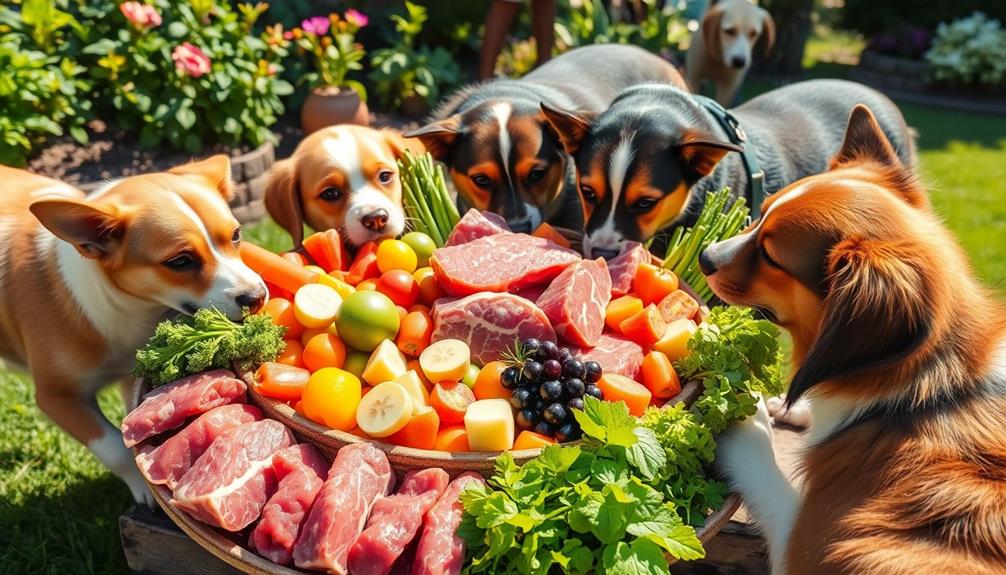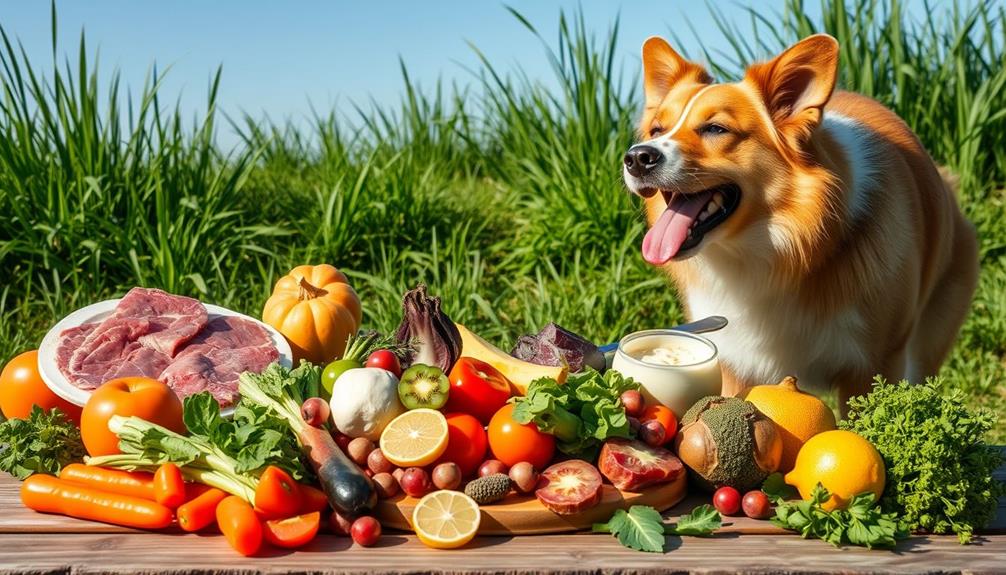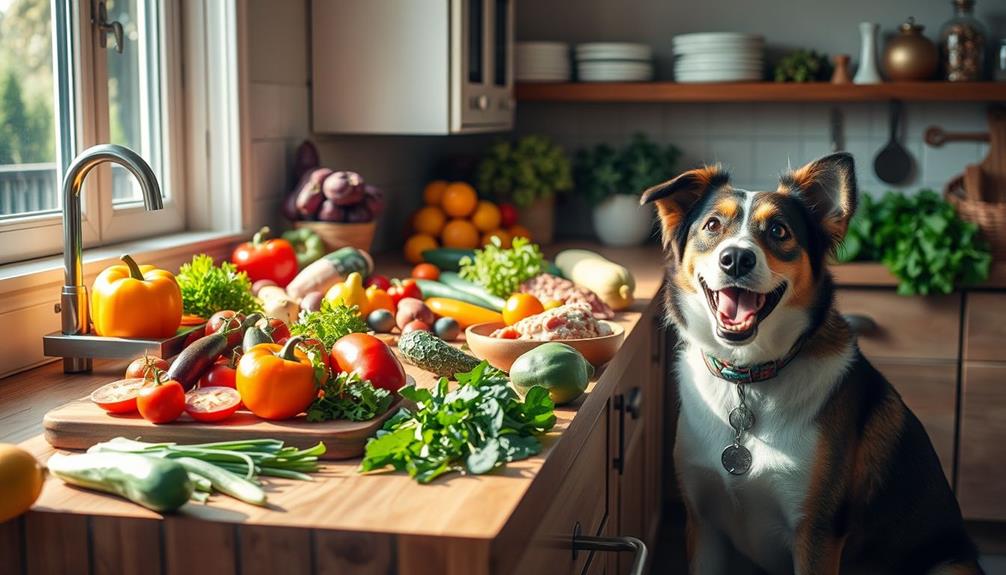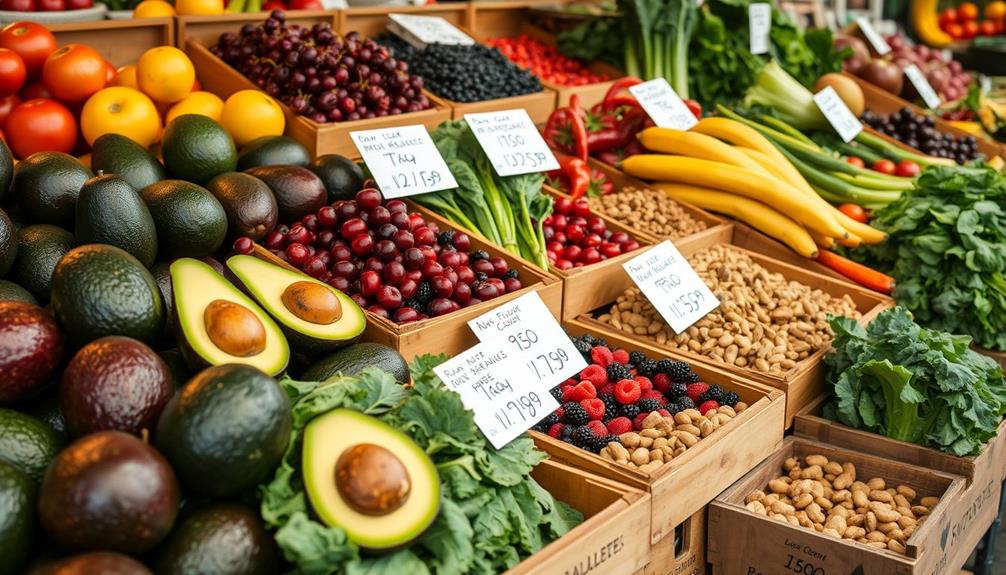Raw food usually takes about 4 to 8 hours to digest in dogs, making it a faster option than processed diets, which can take up to 12 hours. Smaller dogs and puppies may even digest raw food in as little as 4 hours. The quicker digestion supports better nutrient absorption and fewer gastrointestinal issues, leading to firmer stools and less gas. Factors like your dog's size, age, and the specific diet composition can all influence digestion time. If you want to uncover more insights into feeding raw diets and their benefits, there's plenty more to explore!
Key Takeaways
- Raw food typically takes 4-8 hours to digest in dogs, faster than the 8-12 hours for processed food.
- Smaller dogs and puppies may digest raw food in as little as 4 hours.
- Raw diets promote better nutrient absorption and result in smaller, firmer stools compared to kibble.
- Factors like age, breed, and size influence digestion speed and efficiency in dogs.
- A healthy gut supports 70-90% of a dog's immune system, emphasizing the importance of a balanced diet.
Overview of Canine Digestion
When it comes to canine digestion, understanding how your dog's body processes food can help you make better dietary choices. The dog's digestive system is uniquely adapted to handle raw food, which typically digests faster than processed options—taking about 4 to 8 hours compared to 8 to 12 hours. This efficiency is largely due to the high protein and moisture content in raw diets, which supports a healthy canine gut.
Additionally, ensuring your dog maintains a balanced diet, possibly incorporating natural remedies alongside conventional options, can further enhance their digestive health.
Dogs primarily rely on ripping food rather than chewing, limiting their ability to break down food mechanically. Instead, they depend on digestive enzymes to aid in the digestive process. Nutrient absorption is essential and mainly occurs in the small intestines, where raw food digestion allows for quicker uptake of important nutrients.
A healthy canine gut is fundamental for your dog's overall health, as 70-90% of their immune system resides there. Factors like your dog's age can influence how effectively they digest food and absorb nutrients.
Raw Food Digestion Timeline
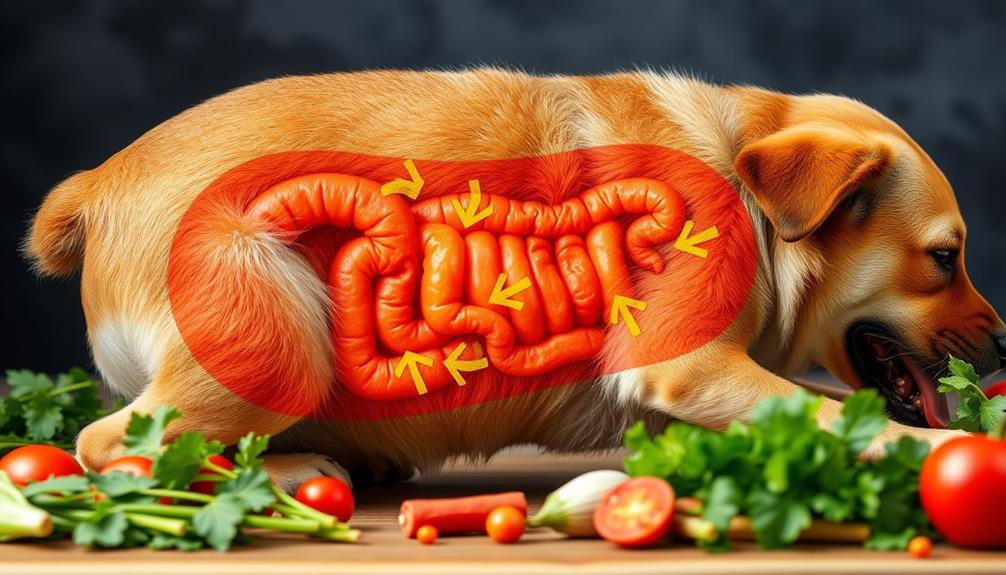
Raw food digestion in dogs typically takes between 4 to 8 hours, making it a quicker process compared to cooked diets, which can take 12 to 15 hours. This speed is largely due to the presence of live enzymes in raw food and the absence of starchy ingredients that slow digestion.
Smaller dogs and puppies may digest raw food in as little as 4 hours, while larger dogs might take the full 8 hours. Providing healthy snacks like natural ingredients can also enhance digestion and overall health.
As your dog's gastrointestinal tract processes this diet, you'll notice some health benefits. Dogs on raw food often experience smaller, firmer, and less frequent bowel movements, indicating a more efficient digestion process.
This can lead to reduced gas buildup and fewer gastrointestinal issues when compared to kibble or processed diets. The raw food diet promotes quicker nutrient absorption, which not only supports your dog's overall health but also guarantees they're getting the most out of their meals.
Factors Impacting Digestion
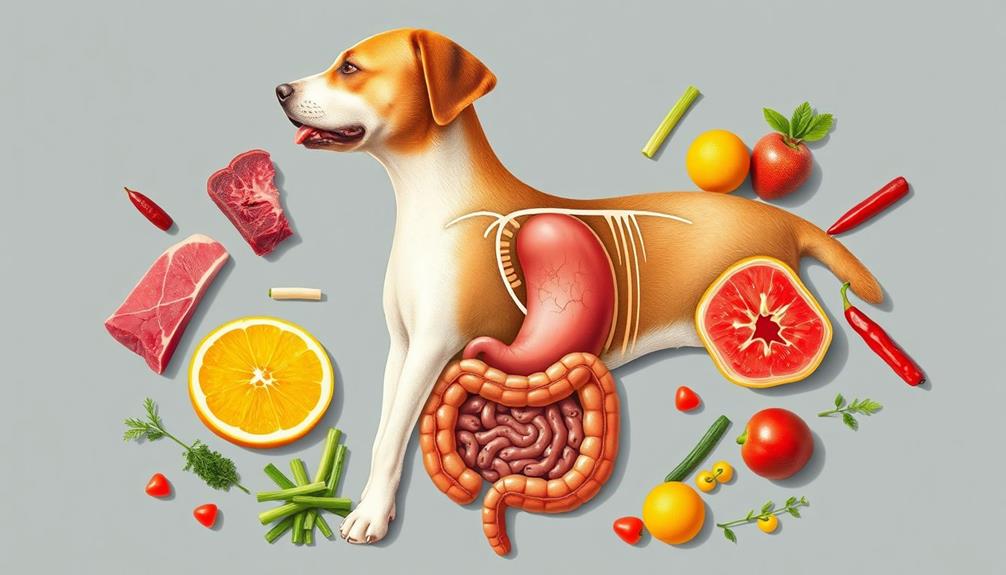
Several factors impact how quickly a dog digests raw food, and understanding these can help you tailor their diet for ideal health.
Digestion time for raw food typically ranges from 4 to 8 hours, which is faster than processed foods. A dog's size plays a significant role; smaller dogs generally digest food more quickly than larger breeds.
Additionally, age and breed can influence digestion speed, with younger dogs often having faster metabolisms.
It's also essential to take into account financial considerations for elderly care when maintaining a dog's diet, as affordability can affect food choices.
The composition of the diet also matters. Raw food, rich in proteins and moisture, promotes quicker breakdown and nutrient absorption compared to dry kibble.
Another important aspect is a dog's activity level; more active dogs tend to digest food faster due to their increased metabolic demands.
Stages of Digestive Process
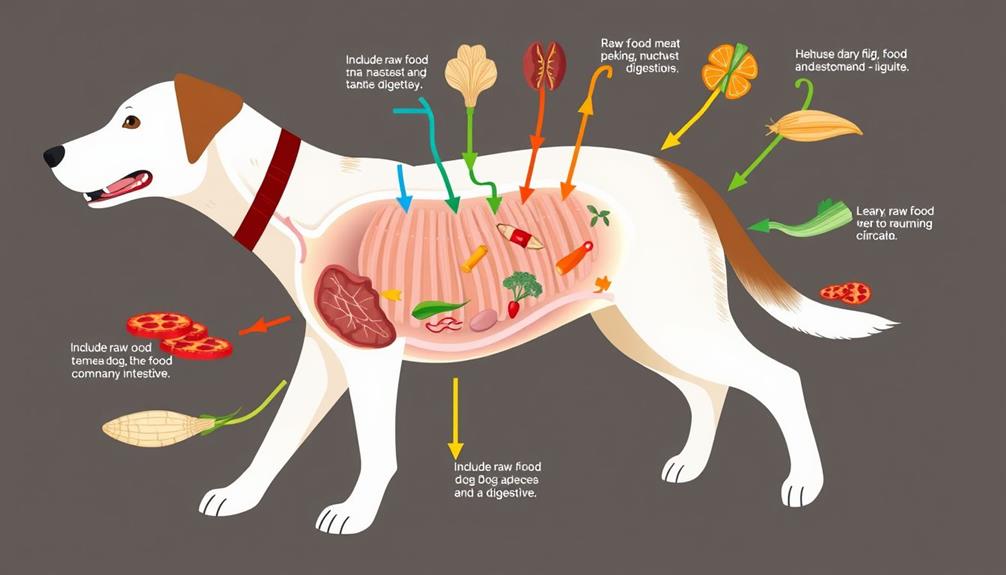
The digestive process in dogs involves several key stages that work together to break down and absorb nutrients from their food. It all begins in the mouth, where the act of chewing breaks down raw food and saliva's enzymes initiate carbohydrate digestion.
Once swallowed, food moves down the esophagus into the stomach. Here, hydrochloric acid and natural enzymes work to digest proteins and fats, creating a semi-liquid substance known as chyme. Proper diet is vital for maintaining digestive health, and understanding nutritional needs can help guarantee your dog thrives on ultimate pet care guidelines.
From the stomach, chyme travels to the small intestines, the stage where nutrient absorption takes place. Tiny finger-like projections called villi line the intestines, allowing for effective absorption of nutrients into the bloodstream. This stage is essential for maintaining your dog's health, as it provides necessary nourishment.
On average, raw food takes about 4 to 8 hours to fully digest, which is considerably faster than dry kibble, taking 8 to 10 hours. In healthy dogs, the entire journey from ingestion to elimination typically wraps up within 8 to 12 hours.
Understanding these stages helps you appreciate the efficiency of your dog's digestive systems and the benefits of a raw food diet.
Importance of Digestive Health
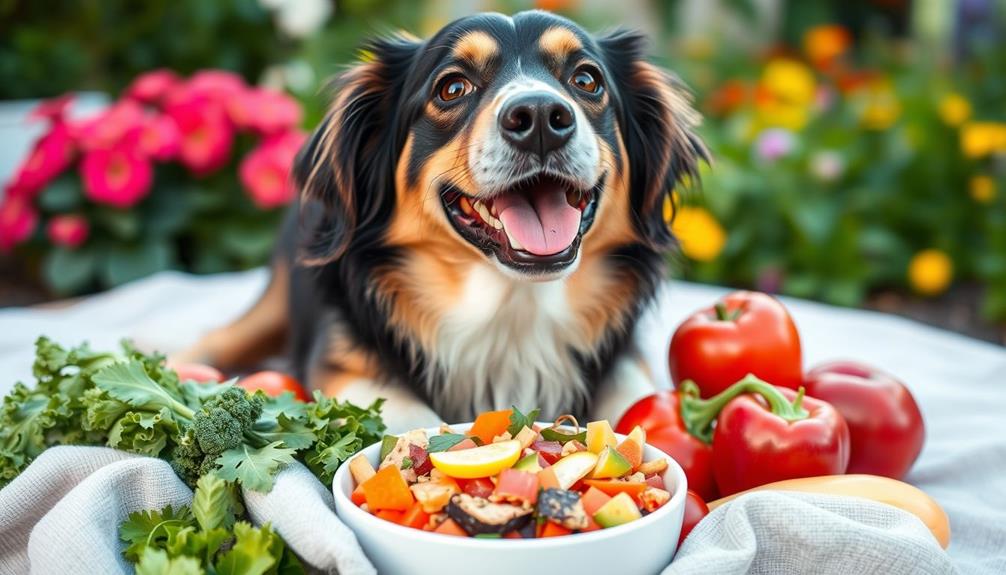
Digestive health plays an indispensable role in your dog's overall well-being. A healthy gut contributes to 70-90% of your dog's immune system, making it essential for disease resistance. Incorporating natural supplements like essential oils for digestive support can further enhance gut health.
When you prioritize your dog's digestion process, you're ensuring efficient nutrient absorption, which is critical for maintaining energy levels and overall health. Feeding your dog a balanced diet rich in natural ingredients can promote gut health by fostering beneficial bacteria.
This balance is necessary for peak digestion and prevents potential digestive problems that may arise from processed foods. Regular veterinary check-ups can help monitor your dog's digestive health, allowing for early detection of any issues.
Being aware of changes in your dog's digestion, such as bloating or changes in stool consistency, can help you act quickly and seek veterinary intervention if needed.
Common Digestive Issues
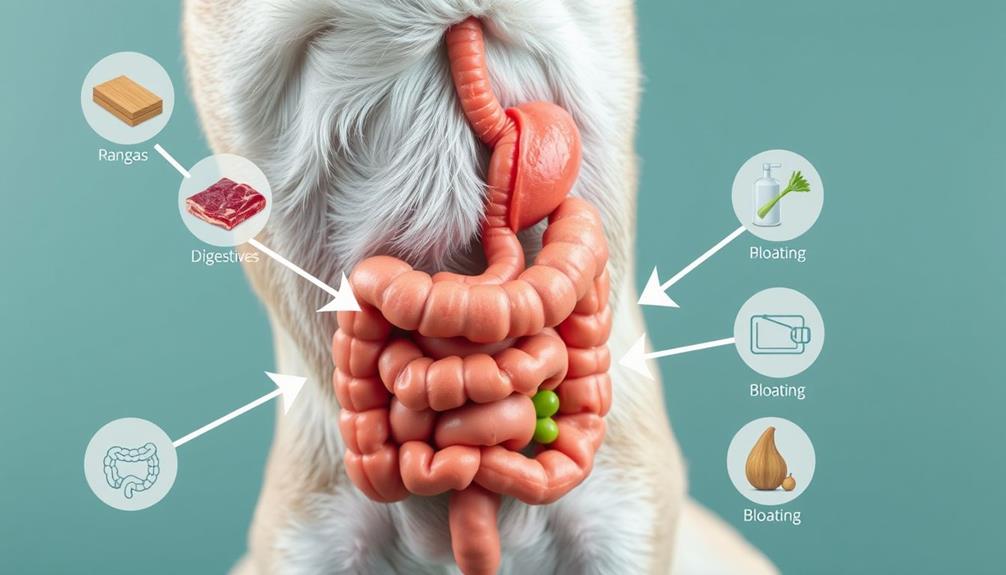
While you may think of your dog as healthy and happy, it's essential to recognize that common digestive issues can arise unexpectedly. Vomiting, diarrhea, gas, and bloating are all symptoms that can point to underlying health concerns. Often, these digestive issues are exacerbated by dietary choices, particularly when it comes to processed foods.
Incorporating a balanced diet with raw foods can help alleviate some of these concerns, as it promotes better digestion and overall health. If your dog shows signs of reduced appetite, weight changes, or abdominal pain, it's time to consult your veterinarian.
Constipation can result from low fiber intake or dehydration, while excessive fiber may lead to diarrhea. This highlights the significance of a balanced diet tailored to your dog's needs. Dogs on a raw food diet tend to experience fewer digestive issues, thanks to the absence of fillers and the presence of natural enzymes in raw ingredients.
Additionally, yoga for back pain can provide relief for dogs suffering from discomfort that may impact their digestion.
Monitoring your dog's stool consistency is another way to gauge digestive health. Well-formed feces typically indicate that your dog is digesting food properly and receiving a balanced diet. By paying attention to these factors, you can help guarantee your dog maintains good digestive health and avoids uncomfortable issues.
Signs of Healthy Digestion
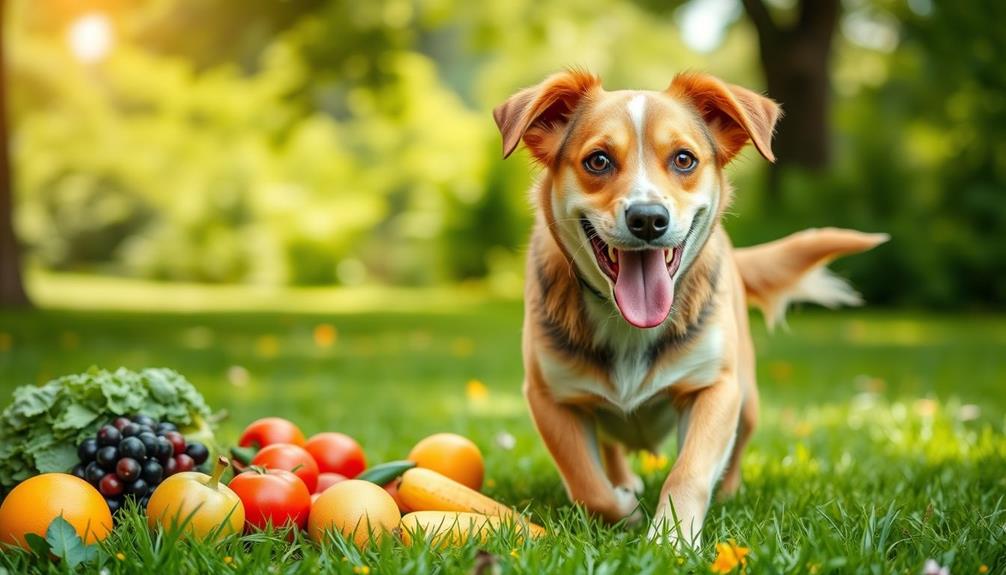
Recognizing signs of healthy digestion in your dog can help you spot potential issues early. One of the first indicators is regular, firm stool. When your dog is on a raw diet, you'll notice that the stool is typically smaller and less odorous, suggesting optimal digestive health.
A consistent appetite and energy level are also key signs, reflecting efficient nutrient absorption and overall well-being. Additionally, a diet rich in antioxidants, like celery juice, can support your dog's digestive process and contribute to their overall health.
Pay attention to bowel movements as well; ideally, your dog should have them 1-3 times a day, especially after consuming raw food. A shiny coat and healthy skin are further evidence of good digestion, as proper nutrient absorption supports their overall health.
Additionally, watch for minimal to no gas build-up. If your dog exhibits signs of bloating or excessive gas, this may indicate a lack of digestive efficiency.
Benefits of Raw Diet

Switching to a raw diet can greatly enhance nutrient absorption for your dog, making the most of every meal.
This dietary change can also positively impact your dog's emotional and psychological growth, as proper nutrition is essential for overall development.
You'll likely notice improved digestive efficiency, leading to healthier skin and a shinier coat.
These benefits not only keep your pup feeling great but also contribute to their overall well-being.
Key Domains of Development in Psychology
Enhanced Nutrient Absorption
Many dog owners notice significant benefits when shifting their pets to a raw diet, particularly regarding enhanced nutrient absorption. With raw food, digestion typically takes about 8 hours, allowing your dog to absorb nutrients more quickly than with cooked diets, which can take 12-15 hours. This quicker digest food process means your dog can access essential vitamins and minerals more efficiently.
Incorporating a raw diet can also lead to better overall health, as it encourages a balanced intake of nutrients and minimizes the risk of deficiencies, which aligns with sound investment strategies for your pet's wellbeing.
The presence of live enzymes in raw food plays a vital role in breaking down nutrients, leading to improved absorption. By reducing fillers and artificial additives, a raw diet encourages a cleaner digestion process, minimizing any hindrances to nutrient uptake.
You'll likely see a positive impact on your dog's health, including increased energy levels, a shinier coat, and a stronger immune system.
Additionally, studies show that dogs on raw diets produce smaller and firmer stools, indicating more efficient nutrient utilization and less waste. This cleaner digestion reflects how well your dog's body is processing and absorbing the nutrients it needs, contributing to its overall health.
Embracing a raw diet can truly enhance your furry friend's quality of life.
Improved Digestive Efficiency
When you choose a raw diet for your dog, you're likely to notice improved digestive efficiency almost immediately. Raw food typically takes about 4 to 8 hours to digest, considerably faster than the 8 to 12 hours required for processed diets. This quicker breakdown is largely due to the live enzymes present in raw ingredients, which aid in digesting nutrients effectively.
Additionally, a raw diet can contribute to overall health and longevity, as it often includes a balanced range of nutrients essential for your dog's well-being, similar to lifestyle for longevity.
You'll likely see your dog producing smaller stools that are firmer, indicating better nutrient absorption and less undigested waste. These changes point to enhanced digestive efficiency, as raw diets help maintain a healthy gastrointestinal tract.
Furthermore, you'll notice reduced gas and bloating, especially in larger breeds, since raw food lacks fillers and grains that can be more challenging to digest.
Healthier Skin and Coat
A raw diet can greatly enhance your dog's skin and coat health, thanks to the rich supply of essential fatty acids and nutrients it provides. When you feed your pup high-quality raw food, you're eliminating fillers and artificial additives that can trigger skin allergies. This results in fewer skin irritations and a more vibrant appearance.
With a balanced raw diet, your dog's hydration levels improve, keeping their skin moisturized and preventing dryness and flakiness. You'll likely notice reduced odor and improved coat texture, as the natural ingredients work together to support overall skin health. The essential fatty acids found in raw diets play a key role in promoting shiny, healthy fur.
Moreover, regular consumption of raw food leads to improved nutrient absorption, which means your dog gets more out of their meals. This can result in less shedding, allowing for a tidier home and a happier dog.
Dietary Recommendations for Dogs
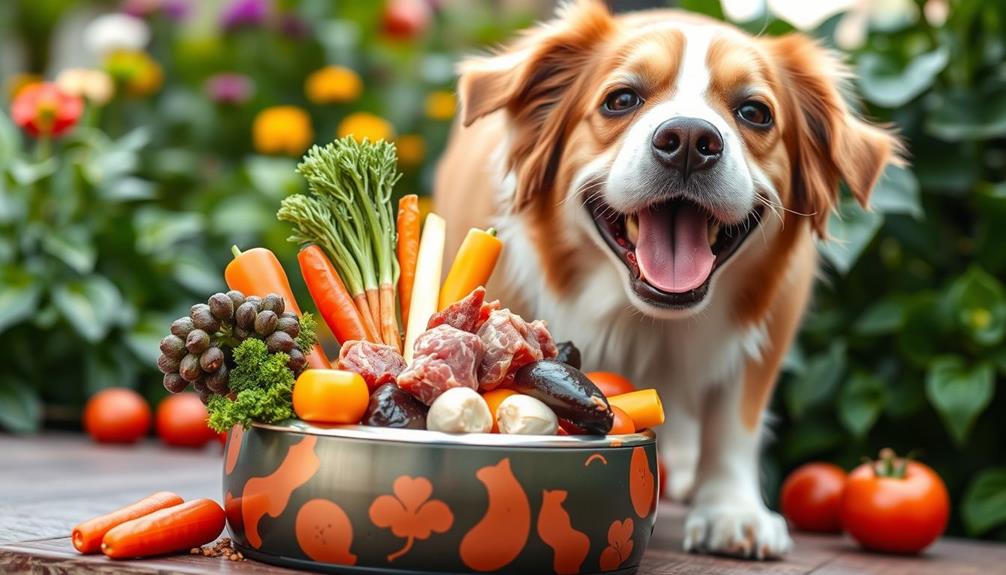
Choosing the right diet for your dog is crucial for their overall health and well-being. A raw food diet can greatly benefit your pup, but it's important to follow some key dietary recommendations to make certain they thrive.
- Variety of Protein Sources: Incorporate different protein sources in your dog's raw diet. This helps meet their nutritional needs and guarantees thorough nutrient intake.
- Balanced Diet: Make certain your dog's diet includes whole meats, organs, and bones, along with fruits and vegetables. This combination provides essential vitamins and minerals.
- Hydration: Adequate hydration is critical for your dog's health. Aim for about 1 ounce of water per pound of body weight daily to support digestion and nutrient absorption.
- Gradual Change: If you're switching to a raw food diet, do it gradually to prevent digestive upset.
Monitor your dog's health closely during this period to make sure they adjust well.
Monitoring Your Dog's Health
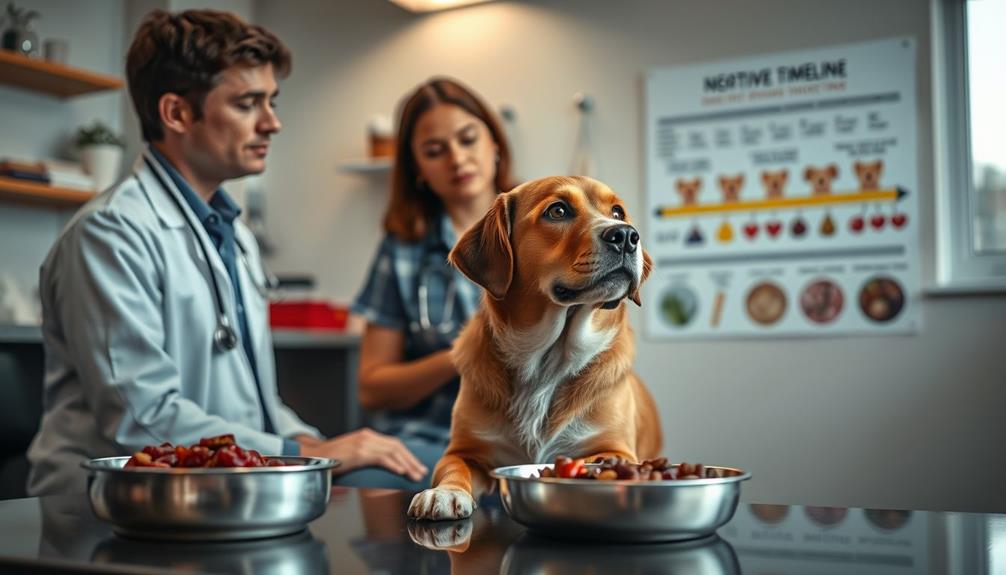
Keeping a close eye on your dog's health is essential for ensuring their well-being, especially when they're on a raw food diet. Monitoring your dog's stool consistency is a key indicator of their digestive health. If you notice signs of undigested food, it could point to potential digestive issues that require attention.
Regular veterinary check-ups are important for evaluating your dog's digestive system and identifying any underlying health conditions.
Watch for appetite changes; a sudden decrease or increase can signal problems. Also, keep an eye out for symptoms like vomiting, diarrhea, or bloating, as these may indicate digestive distress and warrant a trip to the vet.
Additionally, maintaining a record of your dog's hydration levels is crucial. Dehydration can suggest inefficiencies in the digestive system and impact overall health.
Frequently Asked Questions
How Long Does It Take for a Dog to Digest Raw Food?
When you feed your dog raw food, it typically takes about 4 to 8 hours for digestion. Smaller dogs might even digest it faster, usually within 4 hours, promoting better nutrient absorption and firmer stools.
How Long Does It Take for Raw Food to Digest?
Imagine your dog happily wagging its tail, enthusiastically devouring raw food. Typically, it'll digest in about 4 to 8 hours, thanks to live enzymes. You'll notice smaller, firmer stools, reflecting effective nutrient absorption.
How Long Does It Take for Food to Pass Through the Stomach of a Dog?
It usually takes about 4 to 8 hours for food to pass through your dog's stomach. Smaller dogs digest faster, while larger breeds might need more time, depending on their health and size.
How Long Does It Take for a Dog to Adjust to Raw Food?
Shifting your pup to raw food's like teaching an old dog new tricks. It typically takes 5 to 7 days for them to adjust, so ease in gradually to keep their tummy happy and healthy.
Conclusion
In the end, nurturing your dog's digestive health is like planting a vibrant garden. With the right raw diet, you'll see your furry friend thrive, full of energy and joy. By monitoring their well-being and recognizing the signs of a healthy digestive system, you're not just feeding them; you're cultivating a bond that blooms with every wag of their tail. So, embrace this journey together, and watch your pup flourish with each nourishing meal.



